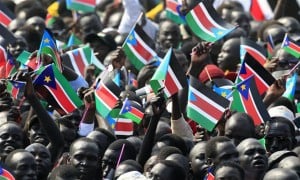Months after South Sudan emerged as the world’s newest country, celebrations have died down and the government in Juba must address the numerous challenges that face the fledgling nation. Apart from addressing unresolved issues with the north and the many domestic challenges, the key to South Sudan’s progress will be maintaining good governance. Much of this will depend on President Salva Kiir and the Sudan People’s Liberation Movement’s (SPLM) abilities to address the needs of the South Sudanese, but also to allow the people’s voices to be heard.
The management of South Sudan’s political dynamics will be a vital indicator in measuring the country’s democratic progress. The SPLM, once Sudan’s political opposition movement with a military branch known as the Sudan People’s Liberation Army (SPLA), fought against the government in Khartoum for more than two decades. The SPLM is now the ruling party of South Sudan.
The SPLM enjoys broad support throughout the country. According to a September poll conducted by the International Republican Institute (IRI), 91 percent of people who belong to a political party belong to the SPLM. Furthermore, 84 percent of respondents view the SPLM either “very favorably” or “favorably.” Such support is not surprising. South Sudanese view the SPLM/A as their liberators in the long struggle against the north, and according to some experts, it is considered treasonous to speak ill of the SPLM.
While the majority of respondents expressed favorability for the SPLM, their views regarding the necessity of political parties were less definitive. Thirty-eight percent of voters agreed with the statement that political parties create division and confusion and are unnecessary in South Sudan. This is compared to a small majority (53 percent) of respondents who believe political parties are needed to make sure the South Sudanese have a say in who governs them.
While the poll does not reveal the reasoning for this division, it’s clear that the South Sudanese majority is content with the SPLM and is divided on the necessity of political parties. Confident with broad public support, the SPLM-led government has made few efforts to encourage the organization of political parties. South Sudan’s administrative system of governance has remained unchanged since liberation, and the SPLM dominates cabinet positions and nongovernmental institutions across the country. The political parties that do exist are not well known, and some have failed to transition from a revolutionary platform to one that works within the democratic process. While South Sudan’s interim constitution includes political parties in the governing process, critics warn that the constitution is skewed to favor the SPLM and preserve its hold on power.
The United States, a lead mediator during the creation of the 2005 Comprehensive Peace Agreement, is a major investor in South Sudan’s government. Since 2005, the U.S. has spent $10 billion for humanitarian relief in support of the peace process and U.N. peacekeeping operations. In an interview with Voice of America, Susan Page, Washington’s first ambassador to South Sudan, emphasized the need for South Sudan to create “a democratic space to allow other political parties to openly express their views.” A major component of this will be enshrining the rights of political parties in the new constitution. The United States must urge South Sudan’s government to encourage a vibrant civil society via political activity. Having an engaged and active electorate puts pressure on the government to respond to the country’s needs. American NGOs such as IRI, which have had success in assisting political party growth in Africa (e.g. Zimbabwe’s Movement for Democratic Change), can facilitate this.
A crucial element of democracy is leaders’ acceptance of defeat when they have lost the confidence of the people. Too often in Africa, rebel groups have been successful in overthrowing autocracies, only to fall into the same pattern as their predecessors. Having amassed significant goodwill from the international community, South Sudan has the potential to be a success story. This opportunity must not be wasted.